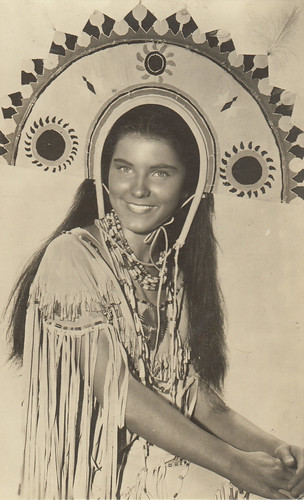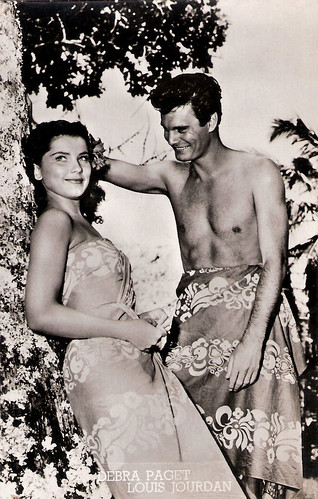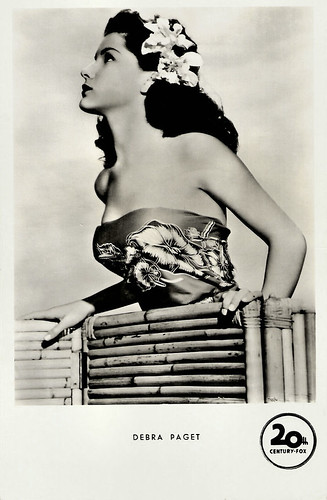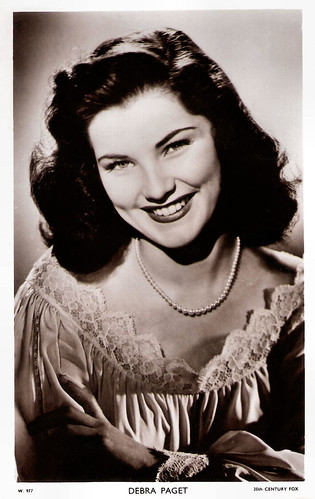Exotic American actress Debra Paget (1933) is perhaps best known for Cecil B. DeMille's epic The Ten Commandments (1956) and Elvis Presley’s film debut Love Me Tender (1956). Later, she had a career in Europe, too. In Germany, she starred in Fritz Lang's two-film adventure saga Der Tiger von Eschnapur / The Tiger of Eschnapur (1959) and Das Indische Grabmal / The Indian Tomb (1960) and in Italy, she also made films.

German postcard by ISV, no. A 14. Photo: 20th Century Fox. Debra Paget in Princess of the Nile (Harmon Jones, 1954).

Yugoslav postcard by Studio Sombor. Sent by mail in 1963.

Vintage postcard, Photo: 20th Century Fox.

Yugoslav postcard by ZK, no. 3896.

West German collector card by Schumann Verlag, Berlin-Lichterfelde-Düd / Heinerle, Bamberg. Photo: Gloria. Debra Paget in Der Tiger von Eschnapur / The Tiger of Eschnapur (Fritz Lang, 1959).
Debra Paget was born as Debralee Griffin in Denver, Colorado, in 1933. She was one of the five children born to former actress Margaret Allen (née Gibson) and painter Frank Henry Griffin.
Hal Erickson at AllMovie: “She may have hailed from Denver, but actress Debra Paget had the sensual, exotic demeanour of an Arabian Nights princess.” And yes, the family moved from Denver to Los Angeles, California, in the 1930s to be close to the developing film industry. Debra was enrolled in the Hollywood Professional School when she was 11.
Stage mother Margaret was determined that Debra and her siblings would also make their careers in show business. And indeed, three of her siblings, Marcia (Teala Loring), Leslie (Lisa Gaye), and Frank (Ruell Shayne), entered show business. Paget had her first professional job at age 8, and acquired some stage experience at 13 when she acted with Charles Coburn in a 1946 production of William Shakespeare's 'The Merry Wives of Windsor'.
Her first notable film role was as Teena Riconti, girlfriend of the character played by Richard Conte, in the Film Noir Cry of the City (Robert Siodmak, 1948). Fresh out of high school in 1949, she acted in three other films before being signed by 20th Century-Fox. Her first vehicle for Fox was the successful Western Broken Arrow (Delmer Daves, 1950) with James Stewart. Paget played a Native American maiden, Sonseeahray (Morningstar), who gives up her life to save Stewart's character.
Paget co-starred with Louis Jourdan in Bird of Paradise (Delmer Daves, 1951), a remake of the 1932 film starring Joel McCrea and Dolores del Rio. It was followed by roles in successful films like the Film Noir Fourteen Hours (Henry Hathaway, 1951), the adventure film Anne of the Indies (Jacques Tourneur, 1951) with Jean Peters and Louis Jourdan, and Prince Valiant (Henry Hathaway, 1954) starring Robert Wagner. Hal Erickson: “Most of her subsequent roles were merely decorative, though she was a more than adequate Cosette in the 1952 version of Les Misérables.”

Spanish postcard no. 1212. Debra Paget as Native American character Sonseeahray in Broken Arrow (Delmer Daves, 1950). Collection: Marlene Pilaete.

Vintage postcard, no. 1151. Photo: 20th Century Fox. Debra Paget in Broken Arrow (Delmer Daves, 1950).

Vintage postcard, no. 552. Photo: 20th Century Fox. Publicity still for Bird of Paradise (Delmer Daves, 1951) with Louis Jourdan.

German postcard by Kunst und Bild, Berlin, no. A 240. Photo: 20th Century Fox. Publicity still for Bird of Paradise (Delmer Daves, 1951).

West German postcard by Kolibri-Verlag. Photo: 20th Century Fox. Debra Paget in Bird of Paradise (Delmer Daves, 1951).

Vintage postcard. Photo: 20th Century Fox.
After the campy costume drama Princess of the Nile (Harmon Jones, 1954) was released, the fan mail Debra Paget received at 20th Century-Fox was topped only by that for Marilyn Monroe and Betty Grable.
The Hollywood studio system dominated American feature film production in the first half of the 20th century. Under it, an actor would sign an exclusive contract to make films for a major studio, such as Fox. The system worked well at first for Paget as her early Fox films did well, so the studio bolstered her film career. In 1955, she broke the exclusivity clause of her contract.
For Fox, she played another Native American girl, Princess Appearing Day, in the Western White Feather (Robert D. Webb, 1955), along with Robert Wagner and Jeffrey Hunter and later at MGM replaced Anne Bancroft as an Indian girl in another Western, The Last Hunt (Richard Brooks, 1956), starring Robert Taylor and Stewart Granger.
Then Fox lent her to Paramount for the part of Lilia, the water girl, in Cecil B. DeMille's biblical epic The Ten Commandments (1956). She had to wear brown contact lenses to hide her blue eyes. At the time of its release, it was the most expensive film made. The Ten Commandments (1956) became her most successful film, grossing approximately $122.7 million at the box office during its initial release. It was the most successful film of 1956 and the second-highest-grossing film of the decade. In 1957, the film was nominated for seven Academy Awards, including Best Picture, and won the Academy Award for Best Visual Effects.
Paget followed it up with Love Me Tender (Robert D. Webb, 1956), the film debut of Elvis Presley. According to Elizabeth Ann at IMDb, Elvis called Debra ‘the most beautiful girl in the world,’ but her mother would not allow them to date. The River's Edge (Allan Dwan, 1957), with Anthony Quinn and Ray Milland, was the last film she made for Fox. After that, her career began to decline.

German postcard by Kunst und Bild, Berlin, no. A 964. Photo: 20th Century Fox. Publicity still for Stars and Stripes Forever (Henry Koster, 1952).

Austrian postcard by Verlag Hubmann (HDH Verlag), Wien, no. 299. Photo: 20th Century Fox. Debra Paget in Stars and Stripes Forever (Henry Koster, 1952).

West German postcard, no. 353. Photo: 20th Century Fox.

Dutch postcard. Photo: 20th Century Fox.

British postcard in the Celebrity Autograph Series, no. 105. Photo: 20th Century Fox. Publicity still for Prince Valiant (Henry Hathaway, 1954).

West-German postcard by Kolibri-Verlag G.m.b.H, Minden/Westf. no. 2482. Photo: 20th Century Fox. Richard Egan, Debra Paget and Elvis Presley in Love Me Tender (Robert D. Webb, 1956).
Debra Paget was typically cast in exotic roles such as South Sea Island maidens or Middle Eastern harem girls. In 1958, she travelled to Germany and India to star opposite Paul Hubschmid and Walter Reyer in Fritz Lang's sumptuous international production Der Tiger von Eschnapur / The Tiger of Eschnapur (1959) and its sequel Das Indische Grabmal / The Indian Tomb (1959). She gained extensive publicity coverage for her blood pressure-raising belly dance in the film.
In 1960, American International Pictures obtained the rights to both films for the USA and combined them into one film called Journey to the Lost City. Tom Wiener at AllMovie: “Contemporary audiences might find Hubschmid and Paget's acting stiff, but psychological nuance is not what Lang was looking for here, and the two do generate genuine sexual chemistry, especially in their flight across the desert, which ends this instalment.”
In Italy, Paget then appeared in the historical drama Il sepolcro dei re / Cleopatra's Daughter (Fernando Cerchio, 1960) set in Egypt during the reign of the pharaoh Khufu (r. 2589-2566 BC). Wikipedia: “For some reason, the English version was translated very differently from the original Italian script, setting the film in the 1st century BC, rather than the early Bronze Age.”
In the USA, Paget appeared on TV in episodes of the Western series, Riverboat (1959) starring Darren McGavin, Rawhide (1960 and 1962) with Clint Eastwood, and Johnny Ringo (1960). In Italy, she starred in another historical film, I Masnadieri / Rome, 1585 (Mario Bonnard, 1961) with Antonio Cifariello.
Her final feature film was the horror film The Haunted Palace (Roger Corman, 1963) with Vincent Price and Lon Chaney Jr. Her last television performance was in an episode of Burke's Law (1965), starring Gene Barry. She retired and later became a born-again Christian. She hosted her own show, An Interlude with Debra Paget, on the Trinity Broadcasting Network (TBN), a Christian network, in the early 1990s.
Paget was married three times. First, she wed actor and singer David Street in 1958. Their marriage was annulled after four months. In 1960, she married prominent director Budd Boetticher in a Mexican café in Tijuana. He was 44; she was 27. She had acted for him in Seven Men From Now (1955). They separated after just 22 days, and their divorce became official in 1961. In 1962, she married Ling Chiech (Louis) Kung, a Chinese-American oil industry executive and nephew of Madame Chiang Kai-shek. This third marriage produced a son, Gregory, but ended in divorce in 1980. Gregory would graduate from Texas A&M University and become a lawyer. Today, Debra G. Kung lives a quiet life in Houston, Texas.

British postcard in the Picturegoer Series, London, no. D 542. Photo: 20th Century Fox.

British postcard in the Picturegoer Series, London, no. W 977. Photo: 20th Century Fox.

Italian postcard by Rotalfoto, Milano.

Yugoslav postcard by Studio Sombor, no. 264.

West German postcard by Kunst und Bild, Charlottenburg, no. A1727. Photo: CCC / Gloria Film / Grimm.
Debra Paget's Snake Dance Scene in Das Indische Grabmal /The Indian Tomb (1959). Source: Snips Of Clips (YouTube).
Sources: Hal Erickson (AllMovie - Page now defunct), Brian G. Walker (Brian's Drive-In Theater), Tom Wiener (AllMovie - Page now defunct), Elizabeth Ann (IMDb), Glamour Girls of the Silver Screen, Wikipedia and IMDb.

German postcard by ISV, no. A 14. Photo: 20th Century Fox. Debra Paget in Princess of the Nile (Harmon Jones, 1954).

Yugoslav postcard by Studio Sombor. Sent by mail in 1963.

Vintage postcard, Photo: 20th Century Fox.

Yugoslav postcard by ZK, no. 3896.

West German collector card by Schumann Verlag, Berlin-Lichterfelde-Düd / Heinerle, Bamberg. Photo: Gloria. Debra Paget in Der Tiger von Eschnapur / The Tiger of Eschnapur (Fritz Lang, 1959).
An Arabian Nights princess
Debra Paget was born as Debralee Griffin in Denver, Colorado, in 1933. She was one of the five children born to former actress Margaret Allen (née Gibson) and painter Frank Henry Griffin.
Hal Erickson at AllMovie: “She may have hailed from Denver, but actress Debra Paget had the sensual, exotic demeanour of an Arabian Nights princess.” And yes, the family moved from Denver to Los Angeles, California, in the 1930s to be close to the developing film industry. Debra was enrolled in the Hollywood Professional School when she was 11.
Stage mother Margaret was determined that Debra and her siblings would also make their careers in show business. And indeed, three of her siblings, Marcia (Teala Loring), Leslie (Lisa Gaye), and Frank (Ruell Shayne), entered show business. Paget had her first professional job at age 8, and acquired some stage experience at 13 when she acted with Charles Coburn in a 1946 production of William Shakespeare's 'The Merry Wives of Windsor'.
Her first notable film role was as Teena Riconti, girlfriend of the character played by Richard Conte, in the Film Noir Cry of the City (Robert Siodmak, 1948). Fresh out of high school in 1949, she acted in three other films before being signed by 20th Century-Fox. Her first vehicle for Fox was the successful Western Broken Arrow (Delmer Daves, 1950) with James Stewart. Paget played a Native American maiden, Sonseeahray (Morningstar), who gives up her life to save Stewart's character.
Paget co-starred with Louis Jourdan in Bird of Paradise (Delmer Daves, 1951), a remake of the 1932 film starring Joel McCrea and Dolores del Rio. It was followed by roles in successful films like the Film Noir Fourteen Hours (Henry Hathaway, 1951), the adventure film Anne of the Indies (Jacques Tourneur, 1951) with Jean Peters and Louis Jourdan, and Prince Valiant (Henry Hathaway, 1954) starring Robert Wagner. Hal Erickson: “Most of her subsequent roles were merely decorative, though she was a more than adequate Cosette in the 1952 version of Les Misérables.”

Spanish postcard no. 1212. Debra Paget as Native American character Sonseeahray in Broken Arrow (Delmer Daves, 1950). Collection: Marlene Pilaete.

Vintage postcard, no. 1151. Photo: 20th Century Fox. Debra Paget in Broken Arrow (Delmer Daves, 1950).

Vintage postcard, no. 552. Photo: 20th Century Fox. Publicity still for Bird of Paradise (Delmer Daves, 1951) with Louis Jourdan.

German postcard by Kunst und Bild, Berlin, no. A 240. Photo: 20th Century Fox. Publicity still for Bird of Paradise (Delmer Daves, 1951).

West German postcard by Kolibri-Verlag. Photo: 20th Century Fox. Debra Paget in Bird of Paradise (Delmer Daves, 1951).

Vintage postcard. Photo: 20th Century Fox.
The most beautiful girl in the world
After the campy costume drama Princess of the Nile (Harmon Jones, 1954) was released, the fan mail Debra Paget received at 20th Century-Fox was topped only by that for Marilyn Monroe and Betty Grable.
The Hollywood studio system dominated American feature film production in the first half of the 20th century. Under it, an actor would sign an exclusive contract to make films for a major studio, such as Fox. The system worked well at first for Paget as her early Fox films did well, so the studio bolstered her film career. In 1955, she broke the exclusivity clause of her contract.
For Fox, she played another Native American girl, Princess Appearing Day, in the Western White Feather (Robert D. Webb, 1955), along with Robert Wagner and Jeffrey Hunter and later at MGM replaced Anne Bancroft as an Indian girl in another Western, The Last Hunt (Richard Brooks, 1956), starring Robert Taylor and Stewart Granger.
Then Fox lent her to Paramount for the part of Lilia, the water girl, in Cecil B. DeMille's biblical epic The Ten Commandments (1956). She had to wear brown contact lenses to hide her blue eyes. At the time of its release, it was the most expensive film made. The Ten Commandments (1956) became her most successful film, grossing approximately $122.7 million at the box office during its initial release. It was the most successful film of 1956 and the second-highest-grossing film of the decade. In 1957, the film was nominated for seven Academy Awards, including Best Picture, and won the Academy Award for Best Visual Effects.
Paget followed it up with Love Me Tender (Robert D. Webb, 1956), the film debut of Elvis Presley. According to Elizabeth Ann at IMDb, Elvis called Debra ‘the most beautiful girl in the world,’ but her mother would not allow them to date. The River's Edge (Allan Dwan, 1957), with Anthony Quinn and Ray Milland, was the last film she made for Fox. After that, her career began to decline.

German postcard by Kunst und Bild, Berlin, no. A 964. Photo: 20th Century Fox. Publicity still for Stars and Stripes Forever (Henry Koster, 1952).

Austrian postcard by Verlag Hubmann (HDH Verlag), Wien, no. 299. Photo: 20th Century Fox. Debra Paget in Stars and Stripes Forever (Henry Koster, 1952).

West German postcard, no. 353. Photo: 20th Century Fox.

Dutch postcard. Photo: 20th Century Fox.

British postcard in the Celebrity Autograph Series, no. 105. Photo: 20th Century Fox. Publicity still for Prince Valiant (Henry Hathaway, 1954).

West-German postcard by Kolibri-Verlag G.m.b.H, Minden/Westf. no. 2482. Photo: 20th Century Fox. Richard Egan, Debra Paget and Elvis Presley in Love Me Tender (Robert D. Webb, 1956).
Her blood pressure-raising belly dance
Debra Paget was typically cast in exotic roles such as South Sea Island maidens or Middle Eastern harem girls. In 1958, she travelled to Germany and India to star opposite Paul Hubschmid and Walter Reyer in Fritz Lang's sumptuous international production Der Tiger von Eschnapur / The Tiger of Eschnapur (1959) and its sequel Das Indische Grabmal / The Indian Tomb (1959). She gained extensive publicity coverage for her blood pressure-raising belly dance in the film.
In 1960, American International Pictures obtained the rights to both films for the USA and combined them into one film called Journey to the Lost City. Tom Wiener at AllMovie: “Contemporary audiences might find Hubschmid and Paget's acting stiff, but psychological nuance is not what Lang was looking for here, and the two do generate genuine sexual chemistry, especially in their flight across the desert, which ends this instalment.”
In Italy, Paget then appeared in the historical drama Il sepolcro dei re / Cleopatra's Daughter (Fernando Cerchio, 1960) set in Egypt during the reign of the pharaoh Khufu (r. 2589-2566 BC). Wikipedia: “For some reason, the English version was translated very differently from the original Italian script, setting the film in the 1st century BC, rather than the early Bronze Age.”
In the USA, Paget appeared on TV in episodes of the Western series, Riverboat (1959) starring Darren McGavin, Rawhide (1960 and 1962) with Clint Eastwood, and Johnny Ringo (1960). In Italy, she starred in another historical film, I Masnadieri / Rome, 1585 (Mario Bonnard, 1961) with Antonio Cifariello.
Her final feature film was the horror film The Haunted Palace (Roger Corman, 1963) with Vincent Price and Lon Chaney Jr. Her last television performance was in an episode of Burke's Law (1965), starring Gene Barry. She retired and later became a born-again Christian. She hosted her own show, An Interlude with Debra Paget, on the Trinity Broadcasting Network (TBN), a Christian network, in the early 1990s.
Paget was married three times. First, she wed actor and singer David Street in 1958. Their marriage was annulled after four months. In 1960, she married prominent director Budd Boetticher in a Mexican café in Tijuana. He was 44; she was 27. She had acted for him in Seven Men From Now (1955). They separated after just 22 days, and their divorce became official in 1961. In 1962, she married Ling Chiech (Louis) Kung, a Chinese-American oil industry executive and nephew of Madame Chiang Kai-shek. This third marriage produced a son, Gregory, but ended in divorce in 1980. Gregory would graduate from Texas A&M University and become a lawyer. Today, Debra G. Kung lives a quiet life in Houston, Texas.

British postcard in the Picturegoer Series, London, no. D 542. Photo: 20th Century Fox.

British postcard in the Picturegoer Series, London, no. W 977. Photo: 20th Century Fox.

Italian postcard by Rotalfoto, Milano.

Yugoslav postcard by Studio Sombor, no. 264.

West German postcard by Kunst und Bild, Charlottenburg, no. A1727. Photo: CCC / Gloria Film / Grimm.
Debra Paget's Snake Dance Scene in Das Indische Grabmal /The Indian Tomb (1959). Source: Snips Of Clips (YouTube).
Sources: Hal Erickson (AllMovie - Page now defunct), Brian G. Walker (Brian's Drive-In Theater), Tom Wiener (AllMovie - Page now defunct), Elizabeth Ann (IMDb), Glamour Girls of the Silver Screen, Wikipedia and IMDb.
No comments:
Post a Comment